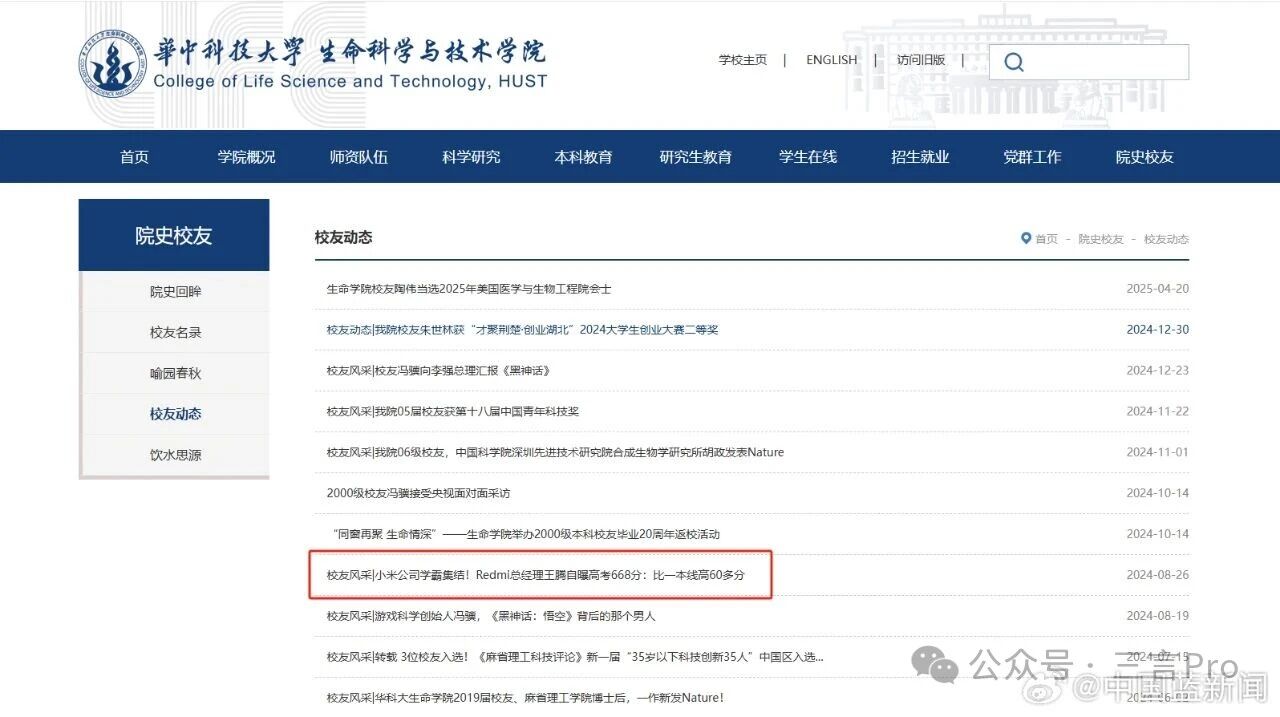On September 8th, Xiaomi released an internal announcement: Wang Teng, an employee of the marketing department in China, leaked confidential company information and committed serious violations such as conflicts of interest. According to regulations such as the "Measures for Handling Violations and Disciplinary Actions of Xiaomi Group Employees" and the "Xiaomi Group Code of Integrity and Honesty", the company has decided to dismiss Wang Teng.
This matter immediately attracted a lot of attention.
In response, Wang Teng stated that he did not steal company secrets for sale and did not receive any money. Having engaged in dereliction of duty, reflecting deeply, but not committing any illegal acts.
On September 9th, some media noticed that the "Alumni News" section on the official website of Huazhong University of Science and Technology, Wang Teng's alma mater, still retained its relevant promotional materials page in the morning. The content involved Wang Teng's admission to Huazhong University of Science and Technology's bioinformatics major with a score of 668 in the college entrance examination, as well as his resume as a Xiaomi executive.

But at 14:00 in the afternoon, upon further inquiry, it was found that the page had been removed and the original link could not be accessed. And the school has not publicly stated the reason for the withdrawal of the page.
Responsible for the reputation of the school?
Or should we follow the logic of realism?
Supporters believe that the school's "Alumni Style" program was originally intended to set a positive example and motivate current students. When an alumnus violates professional rules and no longer meets the standards of a "role model", the school's removal of them is a normal management behavior and a responsibility to the school's reputation.
However, opponents accuse the school's approach of being somewhat hasty and utilitarian, reflecting a realistic logic of "sharing honors when favorable and quickly cutting apart when unfavorable" between prestigious schools and alumni.
Some netizens also believe that even though Xiaomi founder Lei Jun has experienced many business controversies, his alma mater Wuhan University has always retained his honorary committee membership and regarded him as an outstanding alumni representative. So the act of Huake University decisively withdrawing the manuscript is really "realistic" and "heartless".
The author believes that currently, Wang Teng himself emphasizes that his behavior is "not illegal" and only constitutes "dereliction of duty"; The specific reasons for his dismissal are still unclear. If his behavior has not yet involved legal crimes and still falls within the scope of workplace ethics and internal company discipline, is it still necessary for his alma mater to quickly remove his information?
Should universities judge heroes solely based on their success or failure in the workplace, or should they possess a broader and more humanistic spirit of tolerance and reflection?
The operation of Huazhong University of Science and Technology is essentially a "symbiotic relationship of honor" between prestigious universities and star alumni.
The achievements of alumni are a living advertisement for the quality of higher education, and the halo of prestigious schools continues to empower alumni's careers. This mutually beneficial relationship is unbreakable in calm times. However, once one party, especially alumni, exhibits "deviant" behavior, this symbiotic relationship becomes exceptionally fragile. The first reaction of universities is often to protect their reputation and implement "risk isolation".
On the other hand, this incident also highlights the moral premium phenomenon of society towards "public figures" and "high achieving students". Subconsciously, society holds higher moral expectations for highly educated and high-ranking individuals. Once their behavior is tainted, the consequences of public opinion backlash and punishment far exceed those of ordinary people. This huge gap is the psychological root of the phenomenon of "instant collapse of the Honor Building".
But the reason why a first-class university is "first-class" is not only because it has cultivated many successful corporate executives and well-known figures, but also because of the values and sense of social responsibility it carries.
Quickly removing the profile of a 'problematic alumnus' is the simplest and most direct risk management approach. But is this the best way? And is it a bit too hasty?
Huake University may have a more appropriate way of handling it. For example, delaying the decision and waiting for more comprehensive investigation results; Alternatively, using this as a case study, initiate a public discussion on business ethics and professional conduct, and transform it into a vivid warning education for all students.
Pure cutting preserves the surface reputation, but may lose the style and responsibility that a university should have. In the Wang Teng incident, what the public expects may not be an institution eager to distance itself, but an academic hall that can deeply reflect on the essence of education and guide rational social discussions.
How should universities define the value of their alumni, balance honor and utility, and practice the fundamental discussion of "educating people"? What's your opinion?











